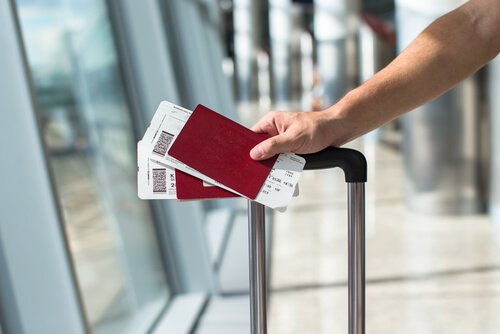The Grief Involved in Emigration

More and more people are moving to other countries nowadays. When some people do, they experience the grief of emigration. This is the pain of leaving behind their home, family, and friends.
Have you ever wondered what it would be like to have to leave your family and friends all of a sudden, without knowing for how long? What would it be like to wake up in a land much different from yours, with different customs and lifestyles? What would it be feel like to realize that you have to learn an entirely new language to express your feelings about all these changes?
These are some of the questions that people who are planning to emigrate ask themselves.
Grief comes from a loss
When you lose something or someone, your brain starts to make emotional and cognitive adjustments. These adjustments are necessary for you to be able to get used to your new reality.
That’s what we mean when we say “grief“. This adjustment process has many common symptoms. For example, you might lose your appetite, start to have anxiety, or have trouble sleeping. You’ll also start to experience negative emotions like sadness and anger.

The grief of emigration doesn’t always start right away. You’ve just left and you’re so busy running errands and taking care of paperwork in your new home that you don’t have much time to think about it. You focus your attention on the task at hand to adjust as best you can.
The grief of emigration tends to start a little while after you’ve left your country, when you start to focus more on how you feel. This is also why some people call it the 6-month syndrome (the average length of the adjustment period). The people of Galicia, in northwest Spain, have their own word for this nostalgia: morriña.
Emigration and multiple kinds of grief
Emigration involves several losses, which means several different kinds of grief. You lose your home, your loved ones and relationships, your job, and, maybe worst of all, even your identity. A lot of the time, people leave their countries due to poverty, war, persecution, etc. This can make the grieving process even harder.
So, if you’ve been thinking of moving to another country, just moved to a new country, or know someone who’s in a similar situation, keep reading. We’re going to give you some tips on how to make the adjustment period as positive and productive as possible.
How to adjust positively
Don’t idealize your new country or your return home
Building up false expectations about the country you’re going to will probably just lead to disappointment at some point. It’s best not to have expectations so that you can be more objective about the good and the bad. On the other hand, you also shouldn’t idealize your return home, thinking that everything will be better than before.
Speaking from my own experience living in Norway for the past year, I’ve realized that we all idealize Scandinavian countries. Yes, they do a lot of things well, and living there is positive in many ways, but there are always some negatives that will impact your experience as well.

Keep things in perspective
Remember that life is characterized by constant changes. Emigration has existed since the beginnings of humanity. Just because you’re moving to another country now doesn’t mean you can’t go back home in the future. You could even move to another country later on and experience more cultures.
We hope this advice will help you manage the stress from the move and the process of adjusting to another country. Avoiding this grief completely isn’t possible, but you can try to keep the grief of emigration from taking a major toll on you.
More and more people are moving to other countries nowadays. When some people do, they experience the grief of emigration. This is the pain of leaving behind their home, family, and friends.
Have you ever wondered what it would be like to have to leave your family and friends all of a sudden, without knowing for how long? What would it be like to wake up in a land much different from yours, with different customs and lifestyles? What would it be feel like to realize that you have to learn an entirely new language to express your feelings about all these changes?
These are some of the questions that people who are planning to emigrate ask themselves.
Grief comes from a loss
When you lose something or someone, your brain starts to make emotional and cognitive adjustments. These adjustments are necessary for you to be able to get used to your new reality.
That’s what we mean when we say “grief“. This adjustment process has many common symptoms. For example, you might lose your appetite, start to have anxiety, or have trouble sleeping. You’ll also start to experience negative emotions like sadness and anger.

The grief of emigration doesn’t always start right away. You’ve just left and you’re so busy running errands and taking care of paperwork in your new home that you don’t have much time to think about it. You focus your attention on the task at hand to adjust as best you can.
The grief of emigration tends to start a little while after you’ve left your country, when you start to focus more on how you feel. This is also why some people call it the 6-month syndrome (the average length of the adjustment period). The people of Galicia, in northwest Spain, have their own word for this nostalgia: morriña.
Emigration and multiple kinds of grief
Emigration involves several losses, which means several different kinds of grief. You lose your home, your loved ones and relationships, your job, and, maybe worst of all, even your identity. A lot of the time, people leave their countries due to poverty, war, persecution, etc. This can make the grieving process even harder.
So, if you’ve been thinking of moving to another country, just moved to a new country, or know someone who’s in a similar situation, keep reading. We’re going to give you some tips on how to make the adjustment period as positive and productive as possible.
How to adjust positively
Don’t idealize your new country or your return home
Building up false expectations about the country you’re going to will probably just lead to disappointment at some point. It’s best not to have expectations so that you can be more objective about the good and the bad. On the other hand, you also shouldn’t idealize your return home, thinking that everything will be better than before.
Speaking from my own experience living in Norway for the past year, I’ve realized that we all idealize Scandinavian countries. Yes, they do a lot of things well, and living there is positive in many ways, but there are always some negatives that will impact your experience as well.

Keep things in perspective
Remember that life is characterized by constant changes. Emigration has existed since the beginnings of humanity. Just because you’re moving to another country now doesn’t mean you can’t go back home in the future. You could even move to another country later on and experience more cultures.
We hope this advice will help you manage the stress from the move and the process of adjusting to another country. Avoiding this grief completely isn’t possible, but you can try to keep the grief of emigration from taking a major toll on you.
This text is provided for informational purposes only and does not replace consultation with a professional. If in doubt, consult your specialist.







